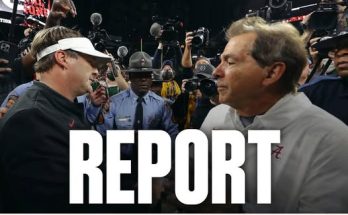Ed Orgeron has never been shy about his love for LSU. The man who once roared “Go Tigers!” into national glory, the fiery Cajun voice that became synonymous with the purple and gold, and the coach who delivered one of the most dominant seasons in college football history in 2019, now seems to be hinting at a return. Following Brian Kelly’s shocking departure from LSU, Orgeron has made it clear — his heart never really left Baton Rouge. And now, with the head coaching position once again open, the man they call “Coach O” says he’d “love” another shot at leading the Tigers.
For LSU fans, it’s a statement that hits deep. Orgeron’s name still echoes in Tiger Stadium, his legacy cemented by that magical 2019 season when Joe Burrow, Ja’Marr Chase, and Justin Jefferson lit up the college football world on their way to a national championship. But the years since his departure have been filled with turbulence, inconsistency, and questions about identity. Now, as LSU faces another period of transition, Orgeron’s bold declaration feels like both nostalgia and unfinished business rolled into one powerful, emotional headline.
When asked recently about the LSU vacancy after Kelly’s unexpected exit, Orgeron didn’t dodge. He didn’t play coy. He smiled, leaned in, and said what many fans have secretly hoped to hear: “I’d love to come back. LSU is home. I still bleed purple and gold.”
That statement alone has sent shockwaves through Louisiana. Orgeron, who left the program in 2021 under tense circumstances, had mostly stayed quiet about his coaching future. But his latest comments suggest something’s stirring. Whether it’s redemption, legacy, or simply love for his alma mater, the fire clearly hasn’t gone out.
The story of Ed Orgeron and LSU is one of both triumph and tragedy. It’s the tale of a hometown hero who reached the mountaintop, only to watch it crumble beneath him. When Orgeron took over the Tigers in 2016, few expected him to restore the program to national prominence. He was considered an interim placeholder, a passionate recruiter but not necessarily a tactical mastermind. Yet, he silenced every critic. In 2019, LSU went 15-0, won the SEC, crushed Clemson in the national championship, and produced arguably the greatest single-season team in college football history.
That season wasn’t just about trophies — it was about pride, personality, and a connection between a coach and a state that felt destined. Orgeron’s Cajun roots, his booming voice, his authentic love for Louisiana — it all made him one of them. The bond between Orgeron and the LSU faithful was raw and real. “This is home,” he said after hoisting the national title. “I was born a Tiger, I’ll die a Tiger.”
But as quickly as he rose, he fell. After the championship, things began to unravel. Coaching staff turnover, questionable hires, and inconsistent performances led to two disappointing seasons. Off-field issues and locker room unrest didn’t help. By late 2021, LSU announced a mutual separation. Orgeron walked away with an $17 million buyout, a handshake, and his trademark grin, saying, “I’ve got no regrets. They gave me six years, we won a national championship, and I’ll always love LSU.”
That might have sounded like closure. But in reality, it wasn’t.
The truth is, Orgeron has always felt LSU was his destiny. His departure wasn’t bitter, but it was unfinished. He’s spent the last few years traveling, reflecting, and occasionally popping up at football events, always welcomed like a legend. Fans still chant his name, still quote his raspy, heartfelt “Geaux Tigers.” But behind the smiles, Orgeron has always known something — his story at LSU didn’t end the way he wanted it to.
Now, with Brian Kelly stepping away, the timing feels poetic. Kelly’s tenure, while successful statistically, lacked the soul and swagger that Orgeron embodied. The Tigers won games, recruited well, and stayed competitive, but something was missing — that unfiltered Louisiana spirit that defined the Orgeron era. For many in Baton Rouge, Kelly felt like an outsider; a professional who led the team but never fully lived it.
Orgeron, on the other hand, is LSU. He’s the embodiment of the program’s identity — tough, emotional, relentless, and deeply rooted in the culture of the state. When he talks about “finishing the job,” he’s not just referring to wins or championships. He’s talking about legacy. About restoring the connection between the program and its people. About bringing back the fire that once made Tiger Stadium shake like no other place in college football.
“I don’t need the money,” Orgeron said in a recent radio appearance. “I don’t need the fame. I just love LSU. If they called, I’d listen — no doubt about it. There’s still some unfinished business there.”
Those words have reignited debate across the college football world. Should LSU consider bringing him back? Could the same magic be recaptured, or has that chapter truly closed?
There’s reason for both optimism and caution. On one hand, Orgeron is still beloved. His recruiting acumen is unquestioned, and his understanding of Louisiana’s football heartbeat is unmatched. He connects with players, families, and fans like few others can. His teams play with emotion, his practices with energy, and his personality electrifies every room he enters.
But on the other hand, LSU has evolved. The SEC has evolved. College football itself has shifted dramatically in just a few short years. The NIL era, the transfer portal, and the arms race in facilities and resources have reshaped how programs operate. The question isn’t just whether Orgeron can still coach — it’s whether he can adapt.
Still, for many, the thought of Coach O patrolling the Tiger sideline again feels like fate waiting to be fulfilled. Imagine the roar of Tiger Stadium as he emerges from the tunnel, fists pumping, voice booming, “Let’s go get ‘em, boys!” It would be pure electricity.
For Orgeron, this isn’t about rewriting history. It’s about restoring it. He knows his flaws — he’s admitted them openly. He’s learned from the mistakes that led to his downfall. More importantly, he’s remained grounded, humble, and self-aware. “You learn a lot when you step away,” he said. “I had time to think about what I did right, what I did wrong, and what I’d do different if I ever had the chance again.”
That kind of reflection could make him even more dangerous the second time around.
The LSU job is one of the most demanding and high-pressure positions in college football. Every coach who takes it knows that expectations aren’t just high — they’re sky-high. National titles aren’t a dream; they’re a standard. Orgeron knows that pressure better than anyone. And that’s exactly why he might be the perfect man to handle it again.
The fans are torn — some want a fresh face, someone younger, perhaps from the new generation of offensive innovators. Others believe Orgeron deserves the chance to finish his story where it began. For them, it’s not just about football. It’s about heart. It’s about the connection that only he can bring back.
If LSU’s administration were to make that call, it would be one of the most emotional and talked-about homecomings in college football history. The narrative writes itself — the prodigal son returns, wiser, calmer, and hungrier than ever, ready to restore the roar to Death Valley.
And even if it doesn’t happen, Orgeron’s words serve as a reminder of something rare in modern sports: genuine love. He doesn’t speak like a man chasing a paycheck or a legacy boost. He speaks like a man who feels a piece of himself still belongs to a place, and that place still belongs to him.
“I’ll always be a Tiger,” Orgeron said once more, with that familiar grin. “If they ever need me — they know where to find me.”
In Baton Rouge, those words hang heavy in the air. Because whether he returns or not, Ed Orgeron’s spirit never really left. His fingerprints are still all over the program, from the swagger in the players to the pride in the fans. LSU may move on, but Coach O will forever be part of its soul.
And who knows? In the wild world of college football, where legends often get one last chance to write their own endings, maybe — just maybe — the Tigers’ story with Ed Orgeron isn’t over yet.


